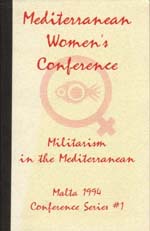


| AWMR - book |



|
 |
Militarism in the Mediterranean
Malta 1994 - 3th Conference Introduction Myriam Spiteri - Debono (Malta) |
It is an honor and a privilege to invited to address this conference again this year. I am sure we will be hearing presentations that will lead us to a better understanding of the problem of Militarism in the Mediterranean region.
We women are faced with established norms that do not always work. We are faced with political systems which, applied at the grassroots level, often betray the ideals they claim to represent. For example, consider the experience of the international women's movement. The demand of women for equal pay has been widely accepted, and in some instances, regulations have been adopted to uphold the principle of equal pay for equal work. However, it is now obvious that in reality, women have not achieved equal pay.
The battle for equal job opportunities, training, and promotion, has yet to be fought. The mere prevention of wage discrimination is not sufficient: equality of status must still be actively promoted. This idea is in accord with the prevailing European Union attitude, which advocates not merely non-discrimination, but equality of treatment. Ideas of democracy.
The changes in the relationship between men and women at home and at work require a new framework of public policy and democracy. It is important that this transformation not just relate to women, while leaving men's lives mainly unchanged. Our husbands, our employers, our political parties, and our government's must also change, or we women will embark on a new era of marginalisation and even greater hardship.
Although advances have been made, all the centuries of patriarchy are difficult to displace, and it is not yet possible for women and men to participate on equal terms at all levels of society. In particular, working conditions must be shaped more closely to the tasks of workers and their larger responsibilities, particularly the demands of parenthood. It is in the best interests of society to ensure that our work does not produce human wrecks as well as good services- people who, at the end of their workday, do not have the energy to be good parents or play an active part in the affairs of their communities.
A fundamental question needing to be answered is just what we mean by "equal opportunity". This concept sometimes seems to be visualized in terms of a race to get to the top in the ambitious pursuit of wealth and prestige. It is one thing to speak of fitting opportunities to one's talents, so that each individual can reach her or his potential, find self-fulfillment, and be of service to the community. It is quite another thing to demand equal opportunity as a springboard to the prizes of status and wealth. While the latter serves to reinforce the violent and greedy elements in our society, the former implies acceptance of differences as they exist, and the adaptation of the norms affecting work to the needs of personal fulfillment, without differentiation of gender.
The Malta Labour Party has always been an active promoter of í equality between women and men. We strongly believe in creating the opportunities for all individuals to find self-fulfillment. We want priority given to achieving equality between individuals and social groups.
The individual's position in society is determined by the prevailing economic and social conditions, as well as by gender. The struggle for equality between men and women must therefore be part of the general struggle for equality in our society: the effort to strengthen the status of those who are deprived of education, training, employment, income, and influence on society. These issues need to be addressed by institutional measures, foremost among them being positive action aimed at accelerating the process of real equality between the sexes.
Labour's concept of social equality places women's rights on the same level as individual and human rights. The notion of the individual is supposed to transcend nations and states. The very fact that we are gathered here this morning is evidence of our faith in ourselves and each other as individuals. Our Association of Women of the Mediterranean Region is based on our common aspiration for justice, peace and equality.
During our meetings here in Malta these past three years, we have been in the process of recognizing the need for collective action in the face of problems that respect no national or racial boundaries. We must leave this conference with the firm resolve to combat deprivation in all its forms and effects, both individually and collectively; and to this end we must do our utmost to harness the support and active participation of other women's associations in our respective countries.



|